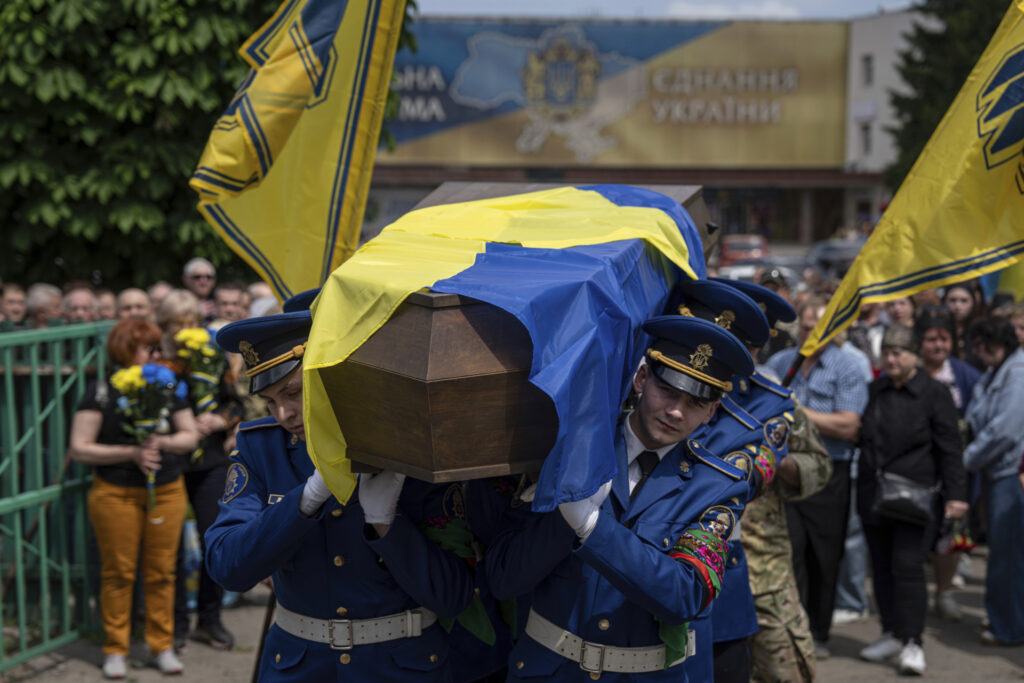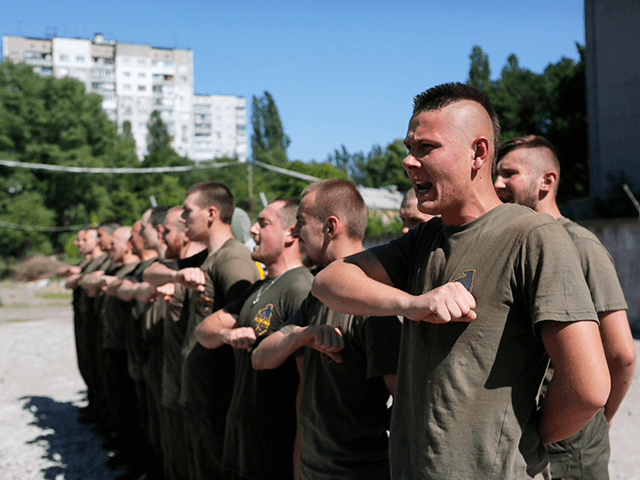The State Department announced on Monday that Ukraine’s Azov Brigade, which has a long history of association with Nazi socialism, will be allowed to receive American weapons and training.
Russia immediately denounced the U.S. for supporting Ukrainian “ultra-nationalists” and “neo-Nazis.”
“After thorough review, Ukraine’s 12th Special Forces Azov Brigade passed Leahy vetting as carried out by the U.S. Department of State,” the State Department said. The statement did not say exactly when it lifted the restrictions whether the Azov Brigade already has access to U.S. equipment or not.
The “Leahy Law,” named for former Sen. Pat Leahy (D-VT), is a set of statutory provisions passed in 1997 that prohibit the State Department and Department of Defense (DoD) from giving funds, equipment, or training to foreign security forces that have been credibly accused of major human rights violations.
The original targets of the Leahy Law included Colombian army units accused of rampantly murdering civilians to kill insurgents and collect bounties. Pro-Palestinian activists frequently accuse the Biden administration of violating the Leahy Law by backing Israel’s war against Hamas terrorists in Gaza, due to the high number of reported civilian casualties.
The Leahy Law gives the Secretary of State discretion to waive its provisions if a foreign government is deemed to be taking credible steps to address human rights complaints. This involves the review process mentioned by the State Department in its remarks on Monday.
The Azov Brigade is a volunteer militia formed in 2014 to fight pro-Russian separatist militants in eastern Ukraine. The brigade was fully autonomous at first, but within two years it was incorporated into the Ukrainian National Guard and last year it was designated as a special forces unit. The unit stepped up its recruiting efforts after receiving that designation, bringing in thousands of new members.
Since its inception, the Azov Brigade has used symbols reminiscent of Nazi iconography and foreign media organizations rarely have trouble finding Azov fighters who are willing to say Adolf Hitler was misunderstood, the Holocaust never happened, or the swastika is just an ancient symbol of sun worship.
“I have nothing against Russian nationalists, or a great Russia, but Putin’s not even a Russian. He’s a Jew,” an Azov Brigade volunteer remarked to the UK Guardian in 2014.
The early Azov volunteers were not supportive of Ukraine’s central government because they felt it was not doing enough to help them battle separatist forces. Some of them talked about replacing the government with a military junta that could unite Ukraine and force the Russians out for good.
The Azov Brigade soared in popularity among Ukrainians after Russia invaded in 2022, quickly gaining a reputation as one of the most effective and determined combat units. The unit defended the city of Mariupol, gaining folk-hero status by holding out for weeks under intense Russian bombardment and suffering hundreds of casualties, but lost.
Nonetheless, the Ukrainian high command hailed the Azov Brigade as “heroes of our time.” Street protests by Ukrainian civilians calling on Russia to free Azov prisoners have become a noted factor of public life in recent months.

Soldiers carry the coffin of their comrade Andrii Konyaev, a member of the Azov regiment defending Mariupol, who was killed on July 29, 2022, at Olenivka, a Russian war prisoner camp, during a funeral ceremony in Fastiv, Ukraine, Tuesday, May 23, 2023. (AP Photo/Evgeniy Maloletka)
In addition to the pro-Nazi political stands of its founding members, the Azov Brigade has been accused of human rights violations by the United Nations, and by organizations such as Amnesty International and Human Rights Watch. The allegations include mental and physical abuse of both civilian and military prisoners.
In 2018, members of the Azov militia who spun off into a group called the “National Druzhyna” were filmed destroying a Romany camp in Kyiv using axes and sledgehammers. The Ukrainian National Police subsequently investigated the vigilante group for “hooliganism.” A series of assaults on Romany camps followed, and when a group of human rights activists assembled in Kyiv to discuss the matter, they were disrupted by an axe-wielding man who claimed to be a veteran of the Azov Battalion.
The Leahy Law was invoked against the Azov Brigade in 2014, banning the unit from receiving weapons or funding from the United States. The 2023 U.S. omnibus spending bill specifically prohibited using any of its funds to “provide arms, training, or any assistance to the Azov Battalion.”
Ukrainian officials and Azov Brigade leaders deny many of these accusations, the most lurid of which date back to the early days of fighting against pro-Russian separatists, and denounce stories about neo-Nazi leanings among militia groups as “Russian propaganda.”
Azov and other Ukrainian militias do indeed figure heavily in Russian propaganda. Whether sincere or not, they were a major element of Russian leader Vladimir Putin’s official justification for invading Ukraine in 2022.
Putin said the invasion was a “special military operation” tasked with “the de-militarization and de-Nazification of Ukraine.” He claimed Ukraine’s neo-Nazi units were bent on “genocide” against ethnic Russians living in the eastern separatist regions.
Most Russian state media coverage of the war portrays Russian forces fighting against Ukrainian “Nazis.” Russia’s annual Victory Day celebration, which credits Russia with defeating Germany in World War II, has been retooled since 2022 to frame the war in Ukraine as a continuation of that same battle against Nazism.
Russian accusations of Nazism often invoke Stepan Bandera, the Ukrainian nationalist leader killed in 1959 by Soviet intelligence agents. Bandera is revered as a hero by some modern Ukrainians, and was officially designated as such by the Ukrainian government in 2005, while Russia regards him as the godfather of neo-Nazi ideology.
Supporters of the Azov Brigade say the unit has cleaned up its act since the human rights allegations of the pre-invasion era and, while some of its members may espouse controversial political views, the unit as a whole is patriotic and devoted to repelling the illegal Russian invasion.
Critics, on the other hand, claim Western media has simply looked away from the more unsavory aspects of Azov and other Ukrainian militia groups as a matter of expediency because that media firmly supports Ukraine against Russia and even more firmly supports the administration of President Joe Biden.
Russia and its allies harp on American support for Ukraine and its alleged neo-Nazi battalions as evidence of U.S. hypocrisy on human rights. China, in particular, is downright gleeful about every report of abusive behavior or controversial statements by Ukrainian fighters.
Unnamed U.S. officials told the Washington Post that the State Department effectively concluded today’s Azov Brigade is “distinct structurally” from the militia that caused so much controversy before the Russian invasion.
Agence France-Presse (AFP) quoted other U.S. officials who said the original Azov Brigade was “disbanded in 2015,” and the new unit, which played such a “heroic role” in defending Mariupol, has passed the stringent vetting process required to lift Leahy Law restrictions.
Ukrainian officials celebrated the State Department’s lifting of Leahy Law prohibitions on Monday as a decisive rejection of Russia’s propaganda.
“The lies about Azov, which the Kremlin regime has been spreading in the West for years, received a devastating blow today,” the statement declared.
“Receiving Western weapons and training from the U.S. will not only increase the combat capability of Azov, but most importantly, will contribute to the preservation of the lives and health of the personnel of the brigade,” the unit said in a statement on Tuesday. “Azov is becoming even more powerful, even more professional and even more dangerous for occupiers.”
The Azov Brigade said it has turned a “new page” in its history, thanks to “long and painstaking work.” Unit commanders said their already impressive combat effectiveness would be increased greatly by access to American funding and training.
Moscow reacted with fury to the announcement. Kremlin spokesman Dmitry Peskov castigated the U.S. for being “ready even to flirt with Neo-Nazis.”
“Such a sudden change in Washington’s positions shows that they stop at nothing in their attempts to suppress Russia, using Ukraine and the Ukrainian people as a tool in their hands,” Peskov said.
“This, in turn, once again confirms the relevance of our concerns in connection with the tendency of the creeping spread of neo-Nazi ideas in the world,” he said.

COMMENTS
Please let us know if you're having issues with commenting.